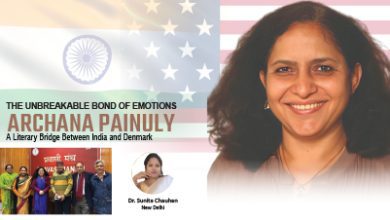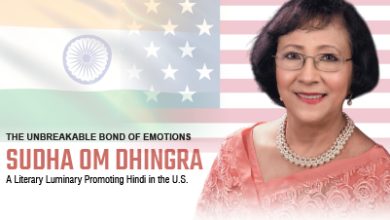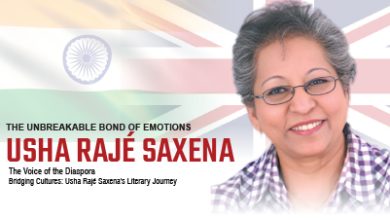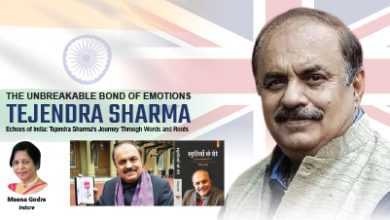THE UNBREAKABLE BOND OF EMOTIONS MAHAKAVI GULAB KHANDELWAL
CALLING INDIA | A Tribute to the Eternal Bloom of Hindi Poetry: Mahakavi Gulab Khandelwal

Under the highly acclaimed Calling India column of Café Social, I wish to share about the legendary poet, Mahakavi Gulab Khandelwal, who is no longer with us. The memories I have with him are unforgettable. In the world of Hindi ghazals, Gulab Khandelwal Ji holds a towering place. A significant part of his life was spent in the United States, yet he continued to serve the Hindi language with unwavering dedication and carved a lasting niche in the literary world.
Gulab Ji was born on 21 February 1924 in Nawalgarh, Rajasthan, India, and passed away on 2 July 2017. He completed his early education in Gaya, a deeply spiritual city in Bihar, and earned his Bachelor’s degree from Banaras Hindu University (BHU) in 1943. He was elected unanimously six times as the President of the All India Hindi Literary Conference in Prayag and also chaired the Indian Council founded by Mahamana Madan Mohan Malaviya. Additionally, he served as President of the International Hindi Association, giving Hindi a global platform through his leadership.

He is regarded as one of India’s foremost poets and contributed prolifically not only in poetry but also in drama, epics, and lyrical compositions. His magnum opus is Gulab Granthavali — a grand anthology of his poetic creations that reflects his philosophical depth, emotional richness, and literary brilliance. His poetic style carried both the fragrance of classical aesthetics and the urgency of modern emotion, effortlessly connecting with readers across generations.
His father’s elder brother, Rai Saheb Surajulal Ji, adopted him in his childhood. It was during his formative years in Kashi, under the mentorship of Bedhab Banarasi Ji, that his deep engagement with literature blossomed. He later moved to Pratapgarh, Uttar Pradesh, but eventually made the United States his second home — though India always remained first in his heart.
His father’s name was Sheetal Prasad Khandelwal, and his mother’s name was Basanti Devi. From a very young age, he began writing poetry. In 1941, his first poem was published with a foreword by none other than Mahakavi Suryakant Tripathi Nirala, a testament to his early literary promise. While in America, he played a significant editorial role in the quarterly Hindi literary magazine Vishwa Patrika, becoming a bridge between Indian literature and the global diaspora.
Even at the age of 82, he did not slow down — instead, he penned his autobiography, titled Koi Kitaab Nahin Hai, a deeply personal and poetic narration of his life’s journey, marked by emotional candor and spiritual reflection.

Some of his notable literary works include:
- Alok Vritt
- Usha
- Ahilya
- Rajrajeshwar Ashok (a powerful play)
- His four famous ghazal anthologies:
- Pankhuriyan Gulab Ki
- Kuch Aur Gulab
- Ek Taza Gulab
- Meri Urdu Ghazal
- Pankhuriyan Gulab Ki
Gulab Ji was a man of immense personality, rooted in humility. The first scholarly dissertation on his life and work was undertaken by Dr. Mukul Khandelwal, a noted academic and author, who also served for many years as a Hindi professor and later Principal at Graduate School College of Women. Her deep research added layers of critical appreciation to Gulab Ji’s already glowing legacy.
I still remember my days as an MA student, when I used to visit Gulab Ji’s home. As young and enthusiastic students, my friends and I were often eager to hear his poems and ghazals straight from his voice. He was always generous with his time. Many a night, we would be seated in his modest living room, listening to his compositions until 1:00 AM, mesmerized by the charm of his words and the sweetness of his voice. His demeanor was so approachable, so loving, that we never felt we were in the presence of a towering literary figure — we felt we were with a true friend, a caring elder, a mentor.
Dr. Mukul Khandelwal continued her work on him even after his passing, ensuring that future generations of Hindi readers would not lose touch with the treasure that Gulab Ji had left behind. His poetry is not only a window into his own soul but also a mirror that reflects the evolving ethos of society, capturing human emotions with rare precision.
What sets his poetry apart is its unwavering optimism and the spirit of constructive rebellion. For Café Social readers, I’d love to share four lines from one of his moving poems:
“Duniya ko apni baat sunane chale hain hum,
Patthar ke dil mein pyaas jagane chale hain hum,
Humko pata hai khoob, nahin aansuon ka mol,
Pani mein phir bhi aag lagane chale hain hum.”
This verse captures the essence of a man who defied the cynicism of the world with the fire of his words — a true revolutionary, not with weapons, but with the pen.
He was known for his incomparable hospitality. Always eager to serve, he never hesitated to help anyone in need. People from his neighborhood often came to him, not just to appreciate his poetry but to seek counsel for their personal dilemmas — and he listened with the same patience with which he would craft his verses. He was more than a poet; he was a spiritual companion, a cultural custodian, a people’s person.
One often wonders — where are such personalities today? Individuals who could blend artistic excellence with moral clarity, who lived for others, and who never lost sight of their roots even when they reached the skies.
Though his children are now settled in America — both his son and daughter-in-law being doctors — Gulab Ji never lost his bond with India. He continued to visit regularly, staying connected with literary circles and spiritual communities. When he passed away at the age of 93, it was not just a poet that India lost — it was a philosopher, a teacher, and a torchbearer of Hindi language and culture.
Even though his physical presence is no longer with us, his words continue to echo in the hearts of readers, students, and scholars. His poetry, filled with simplicity, emotional clarity, and intellectual vigor, remains timeless. Gulab Khandelwal Ji’s literary contribution is a cultural heritage, not just for Hindi-speaking people but for anyone who values human expression at its finest.
His life is a shining example of how one can live across oceans but still breathe the air of their homeland. In today’s era of rapid change and fleeting fame, remembering Gulab Ji is more than just paying tribute — it’s a reminder of the kind of values, humility, and courage that the literary world desperately needs today.
Let us never forget the man who taught us how to ignite fire in water — not to destroy, but to illuminate.

Ph.D. Be.d .
Delhi






